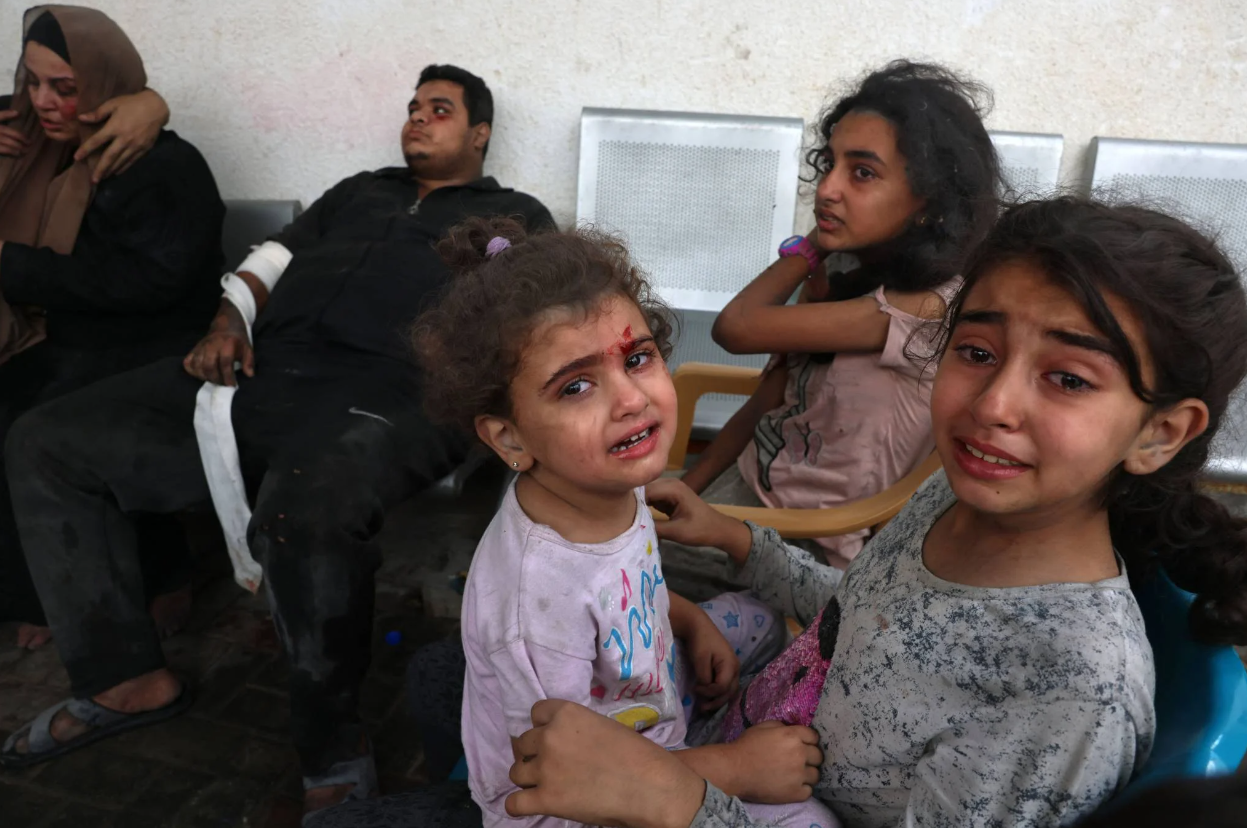Thomas Wynne: Beyond disagreement: A plea for peace and justice
Saturday 28 October 2023 | Written by Thomas Tarurongo Wynne | Published in Editorials, Opinion

Palestinian children wait at the hospital to be checked, as battles between Israel and the Hamas movement rages on, in the southern Gaza Strip on Oct. 12, 2023. (Credit: Said Khatib/AFP)/23102722
How do we disagree, without becoming disagreeable, or when our disagreement is as James Baldwin said, rooted in another’s oppression or the denial of another’s humanity or right to exist, even find a place to agree? Thomas Tarurongo Wynne writes.
If disagreement is not the same as disrespect, then how do I disagree without being disrespectful and speak my truth without drowning out the truth of another?
Joseph Joubert, a French moralist and essayist remembered today largely for his Pensées (Thoughts), said the aim of argument or discussion should not be victorious but to bring progress. So how do we move our ego and position aside so that we progress – if that’s actually what we seek … progress.
As war rages around the world and now in the Middle East, Russia in the East, Yemen, Ethiopia, Myanmar, the Congo, Syria and at least ten other countries, I am acutely aware that the wars that have raged since Vietnam have been the wars of words, conquest, ideas, and sovereignty, long before they became wars of bullets, guns and our social media feeds and televisions.
I remember as a child watching black and white images of the Vietnam war only to learn as an adult the true meaning and suffering of this conflict and the bias of the media and storytellers. The war in Iraq with the lies around weapons of mass destruction, and the suffering of the people on the ground as theirs and other lands were invaded for so many other reasons then what we were told or lead to believe.
This week I read also about the more than 30,000 US servicemen and women who have taken their lives since 9/11 (2001), and when you consider the number who died in the Iraq War, from the US, this is more than three times those who died in battle. Anyone who thinks that a war is won, or that we can bomb our way out of a problem, is misguided and deluded, as war after war just brings more suffering with the numbers stacking up long after the final bullet is fired or boots on the ground have made their way back home.
The war of words, is the first casualty, in fact it was Greek philosopher Aeschylus, the father of Greek tragedy, who said: “In war, truth is the first casualty”, a quote repeated in 1918 by US Senator Hiram Warren Johnson who is purported to have said: “The first casualty when war comes is truth.” Truth is an obstacle to terrorism and war, and it is quickly put to the sword by those who chose to use terrorism and war as their weapon of choice and to further their agenda or to push their world view.
I have been so concerned, at firstly my own position, and then the war on words, with this current conflict in the media over the Middle East, as each day information is hurled at us from so many directions while truth lays somewhere amongst the rubble, amongst the bodies, amongst the grief, amongst the suffering and amongst the innocent.
As the Pacific Islands Leaders meet early next month in Rarotonga, it will be of interest to see a communique come from our leaders regarding the war in Ukraine and the war in the Middle East. Listening each day to the words fought at the security council at the United Nations, it’s clear that this war rages on and clear and definite lines of allegiance and support have emerged with one superpower vetoing the other when there is discussion on the decision for a cease fire in Gaza.
It shows that our world leaders, those who lead the free world and the largest democracies, cannot agree, which is concerning to us all, but none more so than the innocent. Right now, beyond our bias, beyond our positions, beyond our disagreement, beyond our nationalism, beyond our differing faiths and views of the world and each other, the innocent is clearly suffering and it is our plea and prayer, as people of faith, as communities, as Pacific peoples and as a country that as Proverbs 17:5 clearly states – the Lord hates these two things: punishing the innocent and letting the guilty go free – that we can all agree.










































